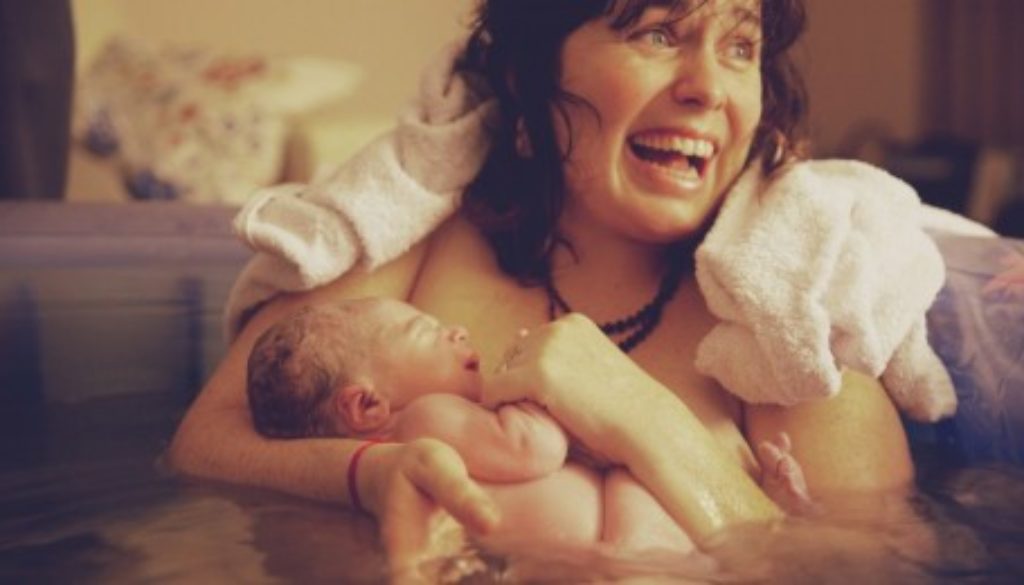“Why Are There Still People Who Want to Give Birth at Home?”
By Karin DeLucia, Midwife, Prenatal Masseuse, In Home Blood Sampling
The most frequently asked questions I receive when I describe my job as a freelance midwife are:
“But why are there still people who want to give birth at home?” Often followed by: “What if something happens?”
It is the repeated asking of these questions that compelled me to write about why women make this choice. My aim is to help our society to accept this childbirth option without being terrified by it or seeing it as an extreme choice made by some families.
“But why are there still people who want to give birth at home? ”
The truth is, we women have never stopped bringing our children into the world in the privacy of our own homes. Today our common belief system states that childbirth should take place in a hospital, viewing it as a dangerous event. In the past, being born at home was a normal, socially accepted event, women passed on their concept of childbirth as a rite of passage that is a part of a woman’s life. Today we are deprived of the intergenerational transmission of this knowledge when women who decide to become mothers, enter into structures with big bellies and come out with a baby. What happens in that timeframe is the “unknown” and the few stories that are shared often pass on a culture of childbirth based on terror and pain. The result is that culturally, we have come to think that without “going somewhere” we are not able to give birth, and that a home birth is scary.
Home birth is common in many European countries and over the years it has become more and more recognized by Italian institutions. There are some regions in Italy that have regulated home birth and provide economic reimbursement for families who decide to deliver at home.
“What if something happens?”
Culturally we are driven to think that childbirth is a matter of luck and not the result of a journey that lasts nine months.  In the nine months of pregnancy we can implement a lifestyle that helps us to maintain our health in the best way possible. During pregnancy our bodies tend to maintain a state of well-being with the obvious goal of preserving the continuation of the species (nature is intelligent). We can help facilitate this by eating healthy foods, getting physical exercise, and making good lifestyle choices. Therefore, if the pregnancy follows a physiological path and there are many signs that the mother and child are both healthy, the possibility that an adverse event may occur during childbirth is significantly reduced.
In the nine months of pregnancy we can implement a lifestyle that helps us to maintain our health in the best way possible. During pregnancy our bodies tend to maintain a state of well-being with the obvious goal of preserving the continuation of the species (nature is intelligent). We can help facilitate this by eating healthy foods, getting physical exercise, and making good lifestyle choices. Therefore, if the pregnancy follows a physiological path and there are many signs that the mother and child are both healthy, the possibility that an adverse event may occur during childbirth is significantly reduced.
We are lucky to live in a part of the world where public health and hygiene are maintained and many diseases of the past have been eradicated, we are not malnourished (we have precisely the opposite problem) and we have access to all of the prenatal tests necessary during pregnancy and before delivery. By taking these precautions we benefit from our own well being and all of the resources that lead to a safe delivery. Why should something go wrong if we minimize the prenatal conditions that lead to negative outcomes?
But what if something should happen? ”
Midwives who assist at home births are trained healthcare professionals, with experience, but above all, with the obligation to stay up to date on the management of emergencies during home births. When an emergency does occur, the midwives carry with them the tools and pharmaceuticals to manage and stabilize the situation until the ambulance arrives. It must be said, however, that statistically non-urgent transfers occur more frequently than those of obstetric emergencies. When a delivery does depart from a normal physiological path, midwives have the time to recognize the situation, discuss it with the woman / family, before deciding to move to a hospital.
Most out of hospital births are successful because there is a lot of work that goes into the of decision making and preparation during pregnancy and provide the family with an unforgettable experience.
Already back in 1985 in Copenhagen the WHO (World Health Organization) stated:
“It is important to remember that it has never been scientifically proven that a hospital is a safer place than a home to give birth to a child if a woman has had a pregnancy without complications. Home delivery studies in developed countries have shown that morbidity and mortality rates for mother and child are equal to or less than the rates for births for uncomplicated pregnancies. These studies have revealed significantly lower interventions in home-delivery than in hospital deliveries (…) There are special cases where some women need specialized hospital care. Many women could have their children at home just with the same outcomes, if not better ones. “
“What are the benefits of a home birth?”
The benefits of a home birth are many!
- Continuity of Care: this means your midwife will follow you during pregnancy, childbirth and the postpartum period.
- Personalized Care: this is a form of care that is tailored to you, based on your requests and your needs.
- Intimacy: the reduction of external interference in your most comfortable and relaxing environment; your home! There is no separation from your child from the moment of birth and your partner can be present and share all of this with you.
- Safety: two trained and equipped midwives at your complete disposal, who are focused only on you, instead of one midwife for numerous women in labour.
- Freedom: freedom of movement and expression, without judgment but with a lot of support.
- Increase of positive health outcomes: the reduction of external interferences during delivery allows a very elaborate, but finely tuned system, to function to its full potential. Home births protect a woman from episiotomies and encourages the proper transmission of the microbiota from mother to child, establishing the foundation of both the short and long-term health of the baby. Delaying the clamping of the umbilical cord for as long as possible allows for a better start in the world for the child by giving him or her as much time as necessary to receive his remaining blood from the placenta, while also receiving the famous stem cells that will be deposited in the areas where babies need it most. This delay also allows for the baby’s system to gently “switch over” from its functioning inside the womb to that of the outside.
- Satisfaction: women who give birth at home have a very high degree of satisfaction with their birth experiences. It is tiring work but if approached consciously it utilizes all of the power that women are capable of, which increases self-esteem and self-confidence. It is a moment of great psychological transformation that should be wisely accompanied.
- A Respectful environment and bonding: respect is not only for the woman who is giving birth but also involves preparing a welcoming environment for the baby, a space that is warm, quiet, with low lighting and contact with mum and dad and siblings if present.
- Respect of your own timing by people who listen.
- Higher rates of successful breastfeeding: all of the conditions listed above lead to greater success in the initiation and establishment of breastfeeding. Because this too is not a matter of luck but is facilitated by good information and support during pregnancy, labor, delivery and especially the two hours after birth.
This article is not intended to demonize other places where women give birth, every woman has the right and should give birth in the place where she feels the safest! Whether that place is her home, a clinic or a hospital.
give birth in the place where she feels the safest! Whether that place is her home, a clinic or a hospital.
There are without a doubt medical procedures that save lives and that should be used in the few cases in which they are warranted but when medical interventions are utilized during a physiological birth, a chain reactions begins, in which one procedures creates the need for another and another, until the body can no longer compensate autonomously and needs further external interventions. Therefore, home births reduce the risk of complications associated with sanctioned iatrogenisis (illness or damage caused by medical interventions) and the subsequent dis-empowerment of the laboring woman.
During pregnancy every woman should be accompanied in her search for information and support. Understanding your resources, your potential and your rights allows you to arrive at the delivery with a lower rate of anxiety, fear and with an awareness of your capabilities.
In conclusion, we can say that childbirth is an adaptive and evolutionary process that rests upon the intrinsic wisdom of the mind and body through its functions. Every woman has – within her – innate abilities which are released when she is free from external pressures and meddling.
In a time of excess, home birth returns as a unique way to achieve the best possible birth outcomes for both mother and child. In an era when we have the knowledge and technology to labour safely, we have a strong need, on a global level, to return to a form of care based upon the needs of mothers and babies. Home birth is a good compromise which delivers a positive impact on a human level, a health level as well as an ecological one.
“Childbirth is a physiological process that our body knows how to do perform. We are competent! We just have to discover our own personal way of doing it. “

Karin DeLucia is a Midwife, Prenatal Masseuse, and performs In Home Blood Sampling. She lived and worked in New Zealand for two years, expanding upon her English and her midwifery skills. She has an Italian Language website www.ostetricakarindelucia.
Images thanks to Kevin liang, Homebirth Australia & Francesco Sili
